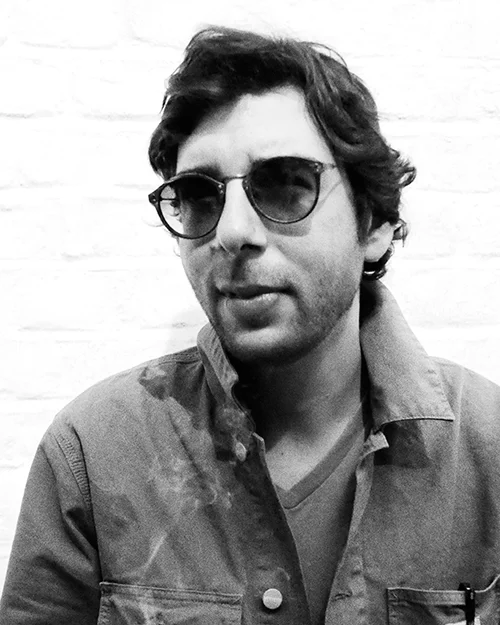How One Man Made Eighty Albums In Ten Years – Meet Lebanese Composer Charif Megarbane
Interview & Photography: Bethany Burgoyne
Lebanese musician, Charif Megarbane has been building a name for himself through a whirlwind of instrumental creations. With a back catalogue of over 80 albums and EPs to date, Charif music transports you into a world that bounces between classic soul, funked up afrobeats, zippy acoustic guitar riffs and vintage Italian movie scores.
Whilst exploring the ‘Hisstology’ of Charif Megarbane, a webpage dedicated to his vast library of work, this musician can be mysteriously found hidden beneath layers of other guises – there's Cosmic Analogue Ensemble, Heroes & Villains, Trans-Mara Express and Monumental Detail to name but a few. Through these multiple identities, Charif records and produces both as a solo artist and with an array of other musicians, each time displaying his prism of eclectic sounds.
“I like trying new things, to pretend I’m somebody else and getting people to buy it. It’s a whole enjoyable creative process of starting and finishing something.”
In the past, we have created whole bands, with fake names and fake biographies, building just enough of a storyline with the right aesthetics to trigger people’s imagination. And people believe the story. It’s a whole creative process and that's the enjoyable thing, starting and finishing something”. This unconventional approach to music making and disguising his own identity reflects the lightness and joy emanating in his tracks. Making for the sake of making and having fun with projects is something which sits him apart from the mainstream music industry. “I don't like the notion of time limits - doing an album, then three years of touring - you have to wait for a label and then you may only release a dozen songs every year. Instead, I’m the King of my own little castle. I sit every night with my toys and create, keeping the best of whatever came out the night before. In the end, I tend to release about 10-20% of what I produce”.
““Creation is the knowledge; by creating you learn. It’s intuitive and we tend to underestimate our instincts” ”
This way of making is what has allowed Charif to gather speed and build such a huge body of work. “Sometimes they can take a month and others are like microwave albums that I do at the weekend, when I have a few hours. Often, these are the best ones, being made in a short amount of time and so close to the original idea.” It is with an almost whimsical approach that Charif attempts to not overwork a track or EP. “You come up with the concept and capture the original idea. You have to move fast before you forget it or before it gets corrupted by the many layers of collaborations, or the 150 hours of listening to the track and picking apart the details. That works for me at least, but I understand it might not work for other people”.
These opinions may be the result of Charif’s own journey into music, having stepped away from a formal education of theoretical knowledge. “Everything is self-taught, I took a couple of guitar lessons when I was a kid but as soon as I started going into the theory, you lost me. I work better from an abstract manner. I can't even remember the names of chords, I have no idea what they are called and refuse to learn more because as soon as you start intellectualising those abstract ideas, you start to corrupt them in a way. Before you turn it into written theory and numbers, and words, sometimes it’s good just to make the music.”
““I work better from an abstract manner. Before you turn it into written theory and numbers, and words, sometimes it’s good just to make the music.” ”
With this outlook in mind, hearing Charif improvising with fluid energy on the guitar and listening to the broad range of genres that litter his ‘Hisstology’ reflects a thirst for exploring various ways of generating music. “It helps that I don’t know what I’m doing! I’ve learnt so much just from listening to sounds and watching people play.” Having spent 8 years living in Nairobi, Kenya, before relocating to Lisbon, Portugal, Charif’s engagement with sounds notably stretches beyond his own cultural upbringing. “If you’re only playing the same pentatonic shit all your life, it gets boring. I decided I wanted to learn the Kora - a massive 21 stringed African harp. It almost looks like you’re playing a play station but it’s a string instrument and you only play it with 4 fingers. Learning that was about getting familiar with sounds, this is the same with every instrument”.
The mischievous way Charif talks about and approaches his music makes for a refreshing narrative. He offers an alternative figure for aspiring musicians to look up to, being easy-going in a way that is comforting and inspiring. “Creation is the knowledge; by creating you learn. It’s intuitive and we tend to underestimate our instincts, always double guessing, triple guessing, asking for peoples advise which only makes us more confused. Sometimes, you just have to do it. If you mess up, it’s alright, if it’s not released under your own name, then you're fine. There's your solution.”
Interview & Photography: Bethany Burgoyne






